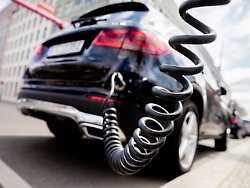More focus on climate protection
Habeck wants to cancel hybrid funding by the end of the year
04/14/2022, 02:11 am
So far, the state has paid buyers of hybrid vehicles a subsidy of between 4,500 and 6,750 euros. The plug-in hybrids are not fundamentally climate-friendly, quite a few are permanently on the road in combustion mode. The Federal Ministry of Economics wants to remove the funding as soon as possible.
Contrary to what was stipulated in the coalition agreement, the Ministry of Economic Affairs wants to phase out the subsidies for cars with electric and combustion engines at the end of this year. Federal Minister of Economics Robert Habeck justified the plans with climate protection. “We want to sharpen the focus in the future promotion of e-cars and focus more on climate protection. In our opinion, plug-in hybrids are marketable and no longer need public funding,” said the Green politician of the Funke media group.
Funding for purely electric cars is to be gradually reduced, as Habeck confirmed. “But then it is still at a high level and therefore interesting for consumers, also because the industry is adding another 50 percent,” added the minister.
In the case of funding for purely electrically operated vehicles, the federal share should still be 4,000 euros in 2023, and 3,000 euros in 2024 and 2025. This emerges from a letter from Parliamentary State Secretary Michael Kellner to members of the traffic light coalition. The proposals from the Green-led Ministry of Economics have not yet been agreed within the coalition and are now to go into departmental coordination within the federal government.
The registration date of the vehicle is decisive for the approval of the subsidy. In view of the currently long delivery times, demands from the industry to link the subsidy to the time of purchase were rejected by Habeck. “We discussed that, but we have to stick to the fact that vehicle registration must remain the relevant point in time,” he told the Funke newspapers. “The susceptibility to abuse is too high if the time of the contract is what counts and not the approval.” He found “it would be helpful if the automobile manufacturers themselves compensated for the difference that can arise as a result of the longer delivery times”.
